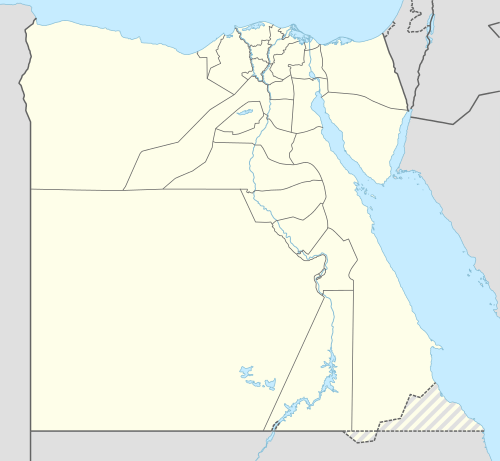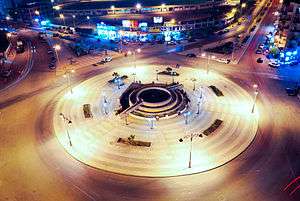Damanhur
| Damanhur دمنهور | |||
|---|---|---|---|
|
Damanhur | |||
| |||
 Damanhur Location in Egypt | |||
| Coordinates: 31°02′26″N 30°28′12″E / 31.04056°N 30.47000°E | |||
| Country |
| ||
| Governorate | Beheira | ||
| Elevation | 18 m (59 ft) | ||
| Population (2011) | |||
| • Total | 242,700 | ||
| Time zone | EET (UTC+2) | ||
| Area code(s) | (+20) 45 | ||
Damanhur (Egyptian Arabic: دمنهور Damanhūr , IPA: [dɑmɑnˈhuːɾ]; Egyptian: Dmỉ-n-Ḥr.w ; Coptic: Ⲧⲙⲉⲛϩⲱⲣ; Ancient Greek: Ἑρμοῦ πόλις μικρά Hermopolis Mikra ) is a city in Lower Egypt, and the capital of the Beheira Governorate. It is located 160 km (99 mi) northwest of Cairo, and 70 km (43 mi) E.S.E. of Alexandria, in the middle of the western Nile Delta.
In Ancient Egypt, the city was the capital of Lower Egypt's 7th Nome of A-ment. It stood on the banks of a canal which connected the lake Mareotis with the Canopic or most westerly arm of the Nile.[1] The city was dedicated to the Ancient Egyptian god Horus. In Greek and Roman times, it was called Hermopolis Mikra or Hermopolis Parva, which would also give it an association with Hermes, the Egyptian Thoth.[2] As Hermopolis, the city attracted the notice of numerous ancient geographers, including Stephanus of Byzantium s. v., Strabo (xvii. p. 802), Ptolemy (iv. 5. § 46), and the author of the Antonine Itinerary (p. 154). It is a Roman Catholic titular see.
In 1986, the population of Damanhur was 188,939. The richly cultivated Beheira province gives rise to mainly agricultural industries which include cotton ginning, potato processing, and date picking. It also has a market for cotton and rice.
Ahmed H. Zewail, who won the Nobel Prize for Chemistry in 1999, was born in Damanhur in 1946.
Etymology
Damanhur was known in the ancient Egyptian scripts by the name "Dmi en Hor", which means the city of the god Hor or Horus, on the grounds that it was a center for the worship of this god. It was also known by other names: in the Egyptian texts, "Behdet"; in the Greek texts "Hermou Polis Mikra" (the lesser city of Hermes), translated to Latin by the Romans as "Hermopolis Parva"; the name "Obollenoboles" (or Apollonopolis) associated it with the Greek god Apollo, and it was also called "Tel Ballamon". Later, the Egyptians reverted to the old name, represented as "Temenhor", which after the Islamic conquest was reinterpreted in Arabic as "Damanhur", the present name.

By 14 of September 1807, a treaty of Damanhur was signed between Mohamed Ali Pasha and the English General Frasier, the chief of Military Troops were attacking the Egyptian Coast and occupying Alexandria by help of promised Al-Alfi Bic, but English troops were defeated by People of Rosetta (a Northern city 30 km east of Alexandria where the Nile and the Mediterranean Sea meet) where the troops were trapped inside the city and many English soldiers died, so The General Frasier requested to Leave Egyptian Shores without delay, which done by 14/9/1807, Damanhur treaty was the First agreement drafted in Egyptian new and modern Era.
Climate
Being located close to the Nile Delta and the northern coast of Egypt, that give Damanhur a hot desert climate (Köppen: BWh), moderated by blowing winds coming from the Mediterranean Sea, typical to the coast. The city gets average precipitation during winter, and rare rain during other seasons. Hail and frost are not unknown specifically during winter.
| Climate data for Damanhur, Egypt | |||||||||||||
|---|---|---|---|---|---|---|---|---|---|---|---|---|---|
| Month | Jan | Feb | Mar | Apr | May | Jun | Jul | Aug | Sep | Oct | Nov | Dec | Year |
| Average high °C (°F) | 18.3 (64.9) |
19.1 (66.4) |
21.7 (71.1) |
25.6 (78.1) |
29.4 (84.9) |
31.2 (88.2) |
32 (90) |
32.3 (90.1) |
30.8 (87.4) |
29.1 (84.4) |
24.8 (76.6) |
20.3 (68.5) |
26.22 (79.22) |
| Daily mean °C (°F) | 13 (55) |
13.6 (56.5) |
15.8 (60.4) |
19 (66) |
22.7 (72.9) |
25 (77) |
26.2 (79.2) |
26.4 (79.5) |
25.1 (77.2) |
23.2 (73.8) |
19.4 (66.9) |
15 (59) |
20.37 (68.62) |
| Average low °C (°F) | 7.8 (46) |
8.2 (46.8) |
9.9 (49.8) |
12.4 (54.3) |
16 (61) |
18.9 (66) |
20.5 (68.9) |
20.6 (69.1) |
19.4 (66.9) |
17.3 (63.1) |
14 (57) |
9.7 (49.5) |
14.56 (58.2) |
| Average precipitation mm (inches) | 25 (0.98) |
21 (0.83) |
9 (0.35) |
4 (0.16) |
3 (0.12) |
0 (0) |
0 (0) |
0 (0) |
0 (0) |
5 (0.2) |
13 (0.51) |
22 (0.87) |
102 (4.02) |
| Source: Climate-Data.org[3] | |||||||||||||
Tomb of Jakov Abuhassira (or simply Abo Hassira)
A nearby town called Damityo (3 kilometres (1.9 mi) south of Damanhur) contains the tomb of the shoemaker Yaakov Abuhatzeira (1805–1880), a Moroccan Rabbi who died there in 1880 while on a pilgrimage to Israel. The site is visited each year by hundreds of devotees, with protests from local inhabitants.[4] A high court in Egypt officially removed the tomb from a list of sites of historical value, so Egyptian government protection stopped.[5] Some Egyptians have protested against permitting Jews to enter Egypt to make the annual pilgrimage to Rabbi Abuhatzeira's tomb.[6][7]
Cultural references
Damanhur is the fictional home of the character Nebamon in the book Rise of the Golden Cobra, by Henry T. Aubin.
Damanhur name is used by the artist eco-village Federation of Damanhur in northern Italy.
References
- ↑ Champollion, L'Egypte, vol. ii. p. 249
- ↑
 "Damanhūr". Encyclopædia Britannica. 7 (11th ed.). 1911. p. 783.
"Damanhūr". Encyclopædia Britannica. 7 (11th ed.). 1911. p. 783. - ↑ "Climate: Damanhur - Climate graph, Temperature graph, Climate table". Climate-Data.org. Retrieved 13 August 2013.
- ↑ Barak, David. Mubarak to allow Jewish pilgrims to visit famous rabbi's tomb, Haaretz, (December 30, 2009).
- ↑ Lipton, Edward P. (2002). Religious Freedom in the Near East, Northern Africa and the Former Soviet States. New York: Nova Publishers. p. 18. ISBN 978-1-59033-390-7. Retrieved 2011-02-16.
- ↑ Miller, David E. (28 December 2010). "Israeli pilgrims to Egyptian grave met with hostility" (Reprint). The Media Line. Retrieved 2011-02-16.
- ↑ "Cairo Airport prepares for Israeli pilgrims". Al-Ahram. 26 December 2010. Retrieved 2011-02-16.
 This article incorporates text from a publication now in the public domain: Smith, William, ed. (1854–1857). "article name needed". Dictionary of Greek and Roman Geography. London: John Murray.
This article incorporates text from a publication now in the public domain: Smith, William, ed. (1854–1857). "article name needed". Dictionary of Greek and Roman Geography. London: John Murray.
External links
- Falling Rain Genomics, Inc. "Geographical information on Damanhur, Egypt". Retrieved 2008-03-30.
- https://www.facebook.com/Egy.Dam Official Facebook page for the city
- http://www.damanhour.5u.com/en.htm English script
- http://www.saeednet.4t.com live cam from damanhour
 S. Pétridès (1913). "Hermopolis Parva". In Herbermann, Charles. Catholic Encyclopedia. New York: Robert Appleton Company.
S. Pétridès (1913). "Hermopolis Parva". In Herbermann, Charles. Catholic Encyclopedia. New York: Robert Appleton Company.
Coordinates: 31°03′N 30°28′E / 31.050°N 30.467°E

